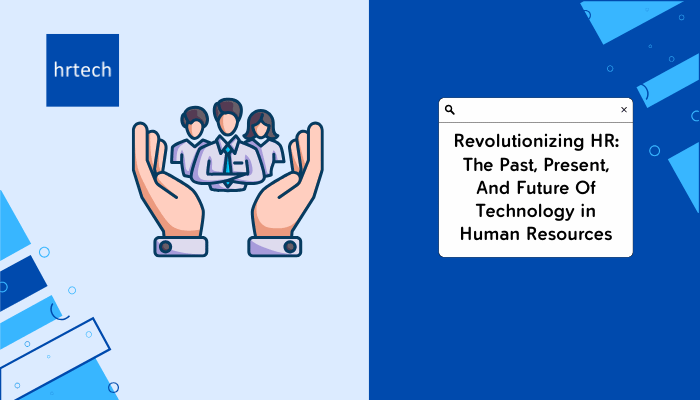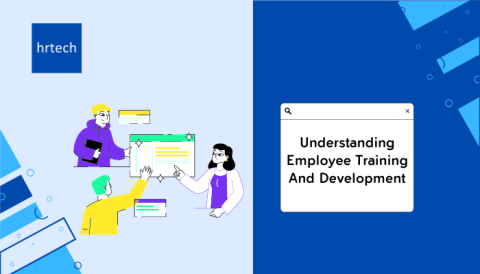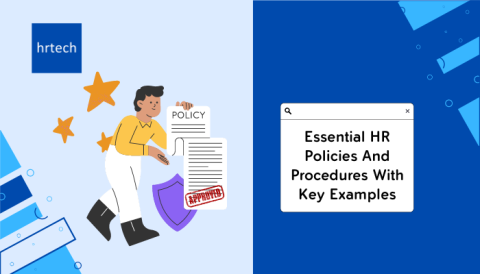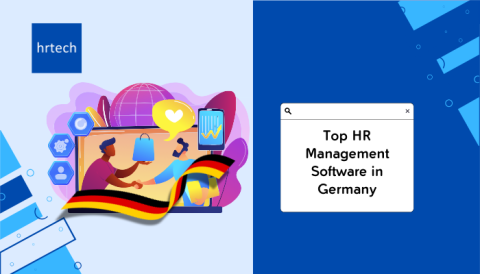HR professionals have a lot of responsibilities to manage throughout the entire employee journey. To simplify things, you can use technology! i.e. HR Tech.
HR Tech is a popular concept in today’s HR industry. But what does it really mean? Think of it as a co-pilot that can help you navigate and automate a lot of time-consuming tasks like onboarding, time and attendance management, compensation management, performance management, and people analytics.
By using software, you can free up your time for more important tasks like writing viral posts on LinkedIn. Many modern HR teams already use HR Tech, but there are a few key ways to implement technology more successfully. In this article, we will explore the evolution of HR technology, discuss its important components, and delve into its effective use.
Definition and Overview Of HR Technology:

Human Resources (HR) technology refers to the diverse range of tools and systems that HR professionals utilize to improve and streamline various aspects of their work. These tools encompass an array of software applications and platforms that facilitate talent acquisition, employee management, performance evaluation, and other HR functions. The use of HR technology has transformed the way HR departments operate by reducing administrative burdens and providing crucial insights for decision-making processes. Consequently, organizations that adopt HR technology are better equipped to handle the complex challenges of modern HR management.
How HR Technology Enhances Business Operations?
Human Resources (HR) technology has emerged as a catalyst for enhancing HR practices across various domains. It does more than just store employee names in neat formats (e.g. Kanetha Ramsey).
Firstly, it facilitates efficient employee payroll management, ensuring timely and accurate compensation. Secondly, it empowers HR professionals in talent management by aiding them in attracting, recruiting, and retaining top talent. The analytical capabilities of HR tech enable data-driven decision-making, thereby optimizing workforce productivity.
Moreover, it simplifies performance management by automating appraisal procedures and providing real-time feedback. Lastly, HR technology plays a crucial role in benefits administration, ensuring that employees receive the compensation and perks that they deserve. Therefore, HR technology has become an indispensable tool for HR professionals in improving their organizational efficiency, effectiveness, and competitiveness.
Importance of HR Technology in Empowering HR Professionals and Streamlining HR Functions:
Integrating human resources (HR) technology has resulted in a significant change in the HR profession. This technology has enabled HR professionals to act as strategic business partners, driving positive business outcomes.
By automating repetitive tasks, HR technology frees HR professionals from mundane and time-consuming tasks, allowing them to focus on more critical initiatives. Furthermore, the integration of HR technology provides HR professionals with access to real-time data and analytics, which informs their decision-making and shapes HR strategies that are aligned with organizational objectives. HR technology also enhances efficiency by minimizing errors, improving data accuracy, and reducing the frequency of manual interventions.
Transforming HR through Agile Workforce Solutions
Evolution Of HR Technology:
Movement from Manual Record-Keeping to Transactional Databases:
The evolution of Human Resources (HR) technology can be traced back to the transition from manual record-keeping systems to transactional databases. In the past, HR professionals relied on paper-based records, making managing employee data laborious and time-consuming.
Impact of Personal Computers on HR Data Usage:
The widespread availability of personal computers significantly accelerated the adoption of HR technology, resulting in the development of early HR information systems. Personal computers’ ability to store and process vast amounts of data enabled HR professionals to manage employee information more efficiently, resulting in enhanced data accuracy.
Shift Toward Web-Based Systems and Remote Access:
The advent of the Internet marked the genesis of web-based HR systems, which granted remote access to HR data. This revolutionary development transformed HR processes by empowering self-service portals, wherein employees could access and revise their personal information, request time off, and peruse company policies. Web-based systems also facilitated collaboration between HR professionals across diverse locations, augmenting communication and efficiency.
Significance of Social Media, Cloud, and Software As a Service in the Evolution of HR Technology:
Social media platforms have paved the way for a new domain of HR technology. HR professionals have capitalized on these platforms to facilitate recruitment, employer branding, and employee engagement. In addition, the widespread adoption of cloud computing has enabled HR systems to be hosted on remote servers, thereby negating the need for on-premises infrastructure. The advent of Software as a Service (SaaS) models has further transformed HR technology by providing scalable, cost-effective, and user-friendly solutions that have revolutionized the industry.
Shift of HR Technology Systems to Cloud Platforms:
The adoption of cloud-based platforms for HR technology systems has become increasingly popular due to their numerous benefits. Cloud-based HR systems have provided HR professionals with enhanced flexibility, scalability, and accessibility. These platforms have enabled HR professionals to access data and applications from any location using any device at any time. Furthermore, cloud platforms ensure better data security and offer seamless integration with other business systems. The shift towards cloud platforms has paved the way for more advanced functionalities and enhanced user experiences.
Important Components Of HR Technology:

Discussion on Human Capital Management and Its Relevance in HR Tech:
Human Capital Management (HCM) is a vital part of HR technology that maximizes the value of an organization’s workforce. HCM manages employee data, recruitment, performance, training, and development. By using HCM, HR professionals can align HR strategies with business objectives, nurture and develop their people, and improve employee productivity and engagement. HCM also helps streamline operations, comply with regulatory requirements, and provide valuable insights through advanced analytics and reporting. Therefore, HCM is critical for effective workforce management and better business outcomes.
Comparison and Differences Between HCM, HRIS, and HRMS:
HCM, HRIS, and HRMS are often used interchangeably, but they differ. HRIS manages employee data, payroll, benefits, and compliance. HRMS includes HRIS functionalities and features like talent, performance, and learning management. HCM provides a more comprehensive approach, integrating HRIS and HRMS capabilities.
Role of HR Technology Tools in HR Function:
Human resources (HR) technology tools are essential in facilitating diverse HR functions. Payroll management systems automate the payroll processes, ensuring accurate and timely compensation to employees. Benefits management software streamlines the administration of employee benefits, including health insurance, retirement plans, and leave policies. Talent management software helps HR professionals attract, assess, develop, and retain top talent. Expense management software simplifies the reimbursement process, minimizing errors and improving efficiency.
Performance management software automates performance evaluations, providing real-time feedback and fostering a culture of continuous improvement. Learning management software facilitates the delivery and tracking of training programs, empowering employees to enhance their skills and knowledge base. Lastly, employee engagement software promotes a positive work environment by enabling effective communication, recognition, and feedback. By utilizing these HR technology tools, businesses can streamline HR functions, reduce errors, and improve overall efficiency.
Effective Use Of HR Technology:
Strategies for Maximizing the Effectiveness of HR Technology:
HR technology has revolutionized how modern workplaces manage their human resources, streamline processes, and enhance employee experiences. To maximize the effectiveness of HR technology, organizations can implement several strategies and best practices:
- Comprehensive Integration: Integrate HR technology with existing systems such as payroll, performance management, and employee benefits to ensure seamless data flow and eliminate redundancies. For example, integrating HR software with payroll systems can automate the process of updating employee information and ensure accurate and timely payments.
- User-Centric Design: Choose HR technology solutions with user-friendly interfaces and intuitive navigation to enhance employee engagement and adoption. User-centric design ensures that employees can easily access and utilize HR tools, leading to improved efficiency and satisfaction.
- Data-Driven Decision-Making: Leverage HR technology to collect and analyze workforce data for strategic decision-making. For instance, organizations can use advanced analytics tools to identify trends in employee performance, turnover rates, and engagement levels, enabling proactive interventions and targeted improvements.
- Personalized Employee Experiences: Implement HR technology that allows for personalized employee experiences. For example, self-service portals enable employees to access their personal information, request time off, and enroll in benefits, empowering them while reducing the administrative burden on HR staff.
- Automation of Routine Tasks: Utilize HR technology to automate repetitive and time-consuming tasks, such as onboarding, leave management, and performance evaluations. Automation frees up HR professionals to focus on strategic initiatives and employee development.
- Mobile Accessibility: Ensure that HR technology solutions are accessible via mobile devices. This allows employees and managers to stay connected and engaged regardless of their location, facilitates timely communication, and provides access to important HR resources.
- Continuous Training and Support: Provide ongoing training and support to employees and HR staff to maximize the utilization of HR technology. Regular training sessions, tutorials, and access to support resources can help ensure everyone is proficient in using the available HR tools.
- Cybersecurity Measures: Implement robust cybersecurity measures to protect sensitive HR data stored in the technology systems. Data breaches can be detrimental to both the organization and its employees, so ensuring the security of HR technology is crucial.
- Feedback Mechanisms: Establish feedback mechanisms to gather insights on HR technology’s effectiveness and user experience. Regular feedback from employees and HR professionals can help identify areas for improvement and optimize HR technology use.
- Scalability and Flexibility: Select HR technology solutions that are scalable and flexible to accommodate the organization’s changing needs. As the business grows or undergoes transformations, the HR technology should be able to adapt and support evolving requirements.
Practical Tips for Organizations
Prioritize the selection of HR technology solutions that align with the organization’s specific needs and long-term goals.
Involve end-users in the selection process to ensure that the chosen HR technology meets their requirements and enhances their daily workflows.
Continuously evaluate the performance and impact of HR technology to identify areas for optimization and improvement.
Foster a culture of innovation and adaptability to embrace new advancements in HR technology and stay ahead of industry trends.
By implementing these strategies and best practices, organizations can effectively leverage HR technology to drive operational efficiency, streamline HR processes, and enhance employee experiences in today’s dynamic workplaces.
Recent Developments in HR Technology
Improving the Entire Employee Experience Through HR Tech:
Human resources (HR) technology has undergone significant evolution, with a focus not only on streamlining HR processes but also on enhancing the overall employee experience. Employee self-service portals have emerged as a comprehensive solution for employees to access HR information, request time off, and manage their benefits, all in one place. Mobile applications have also gained traction, empowering employees to access HR services seamlessly on the go, promoting flexibility and convenience. By integrating HR technology solutions, businesses can enable their employees to access HR services anytime and anywhere, leading to a more efficient, productive, and satisfied workforce.
Role of HR Tech in Retaining Employees with Upskilling and Ongoing Learning
In an era of rapid technological advancements and changing business landscapes, upskilling and ongoing learning have become crucial for employee retention. HR technology is pivotal in supporting employees’ professional growth by providing personalized learning opportunities. Employees can access a vast library of courses and resources tailored to their needs and career goals through learning management systems. HR tech also enables the tracking and monitoring of employees’ learning progress, allowing HR professionals to identify skill gaps and provide targeted development opportunities. By investing in employees’ growth and development, organizations can boost employee engagement, increase retention rates, and stay ahead in a competitive market.
Support from HR Tech for Different Work Models like Remote, Hybrid
The COVID-19 pandemic has accelerated the adoption of remote and hybrid work models. HR technology has played a crucial role in supporting these new working methods. Remote access to HR systems has facilitated seamless collaboration and communication between remote employees and the HR department.
Virtual onboarding processes have been enabled through HR tech tools, ensuring a smooth transition for new hires joining remotely. Moreover, HR technology has facilitated the tracking and managing remote employees’ performance, ensuring accountability and productivity. As organizations embrace flexible work arrangements, HR technology will continue to evolve to meet the changing needs of the workforce.
Future Trends in HR Technology:
Commitment to Diversity, Equity, and Inclusion Through HR Tech
Organizations worldwide increasingly focus on diversity, equity, and inclusion (DEI) as critical areas for growth and development. In this context, HR technology is poised to play a vital role in supporting DEI initiatives. AI-powered recruitment tools, for example, can help eliminate hiring bias by anonymizing candidate information and assessing candidates solely based on their qualifications. Similarly, HR analytics can provide valuable insights into diversity metrics, enabling organizations to identify areas for improvement and measure progress. Furthermore, HR tech can facilitate inclusive learning and development programs by delivering personalized content that caters to the diverse needs of employees. By leveraging HR technology, organizations can foster a culture of belonging and ensure equal opportunities for all.
Strategic Use of AI in HR Functions
Artificial Intelligence (AI) is on the brink of transforming HR functions in the foreseeable future. By leveraging AI-powered chatbots, companies can offer prompt and efficient employee support, addressing routine HR-related queries and facilitating HR processes. Thanks to Natural Language Processing (NLP) algorithms, HR professionals can now analyze employee feedback and sentiment, providing them with critical insights into employee needs and enhancing the employee experience.
Furthermore, AI can streamline talent acquisition by automating resume screening and identifying the most suitable candidates for specific job positions. As AI continues to evolve, HR professionals will be able to focus on strategic initiatives while AI-powered tools handle administrative tasks. This technology will revolutionize HR functions, enhancing employee engagement and organizational performance.
Data-Driven Decision-Making Using HR Analytics
In today’s business world, HR professionals are tasked with the critical responsibility of making data-driven decisions. They are expected to efficiently extract valuable insights from vast amounts of employee data to identify patterns and trends. Such insights help identify areas for improvement, predict attrition, and make informed decisions about talent management and workforce planning. Additionally, HR analytics tools are instrumental in measuring the effectiveness of HR initiatives such as training programs and performance management strategies.
As organizations continue to prioritize data-driven approaches, HR professionals must develop their analytical skills to effectively leverage HR technology and unlock the full potential of HR data. Therefore, HR professionals must thoroughly understand HR analytics to make informed decisions, enhance the overall HR strategy, and contribute to business growth.
Adoption of Cloud-Based HR Systems:
The prevalence of cloud-based HR systems is poised to increase in the near future. Such platforms offer a range of benefits, including scalability, flexibility, and heightened security compared to on-premises solutions. Integrating with other business systems, such as finance and operations, provides a comprehensive view of organizational data. Moreover, cloud-based HR systems are frequently updated, ensuring organizations remain equipped with the latest features and functionalities. As businesses prioritize agility and cost-effectiveness, adopting cloud-based HR systems will become increasingly commonplace.
Importance and Applications of AI and Machine Learning in HR Tech
Artificial intelligence (AI) and machine learning (ML) are set to play a crucial role in shaping the future of HR technology. Among the most promising applications of these technologies are AI-powered chatbots, which are expected to become increasingly sophisticated over time and capable of providing personalized support while automating routine HR tasks. Additionally, ML algorithms will enable predictive analytics, empowering HR professionals to anticipate workforce needs and identify high-potential employees.
The potential of AI and ML in talent acquisition is particularly noteworthy, as these technologies can leverage predictive algorithms to match candidates with job requirements and cultural fit. Furthermore, AI and ML can be instrumental in performance management by providing real-time feedback and personalized development plans. As AI and ML continue to evolve, their applications in HR tech are expected to become even more diverse and impactful.
Conclusion:
The evolution of HR technology has transformed human resources professionals into strategic partners driving positive business outcomes. From manual record-keeping to cloud-based systems, HR tech has streamlined processes and empowered HR professionals to make data-driven decisions. Its importance in efficient talent management, payroll administration, performance evaluation, and benefits administration cannot be overstated.
The future of HR technology lies in embracing trends such as AI, machine learning, and cloud-based systems to enhance the employee experience, support diversity, equity, and inclusion initiatives, and drive organizational success.
If you’re looking to enhance your HR processes and empower your team, consider exploring hrtech Solutions which is one of the leading companies in the industry.
By leveraging cutting-edge technology, you can streamline your HR functions, improve employee engagement, and drive organizational success. Don’t miss out on the opportunity to transform your HR operations—explore our hrtech solutions today!





